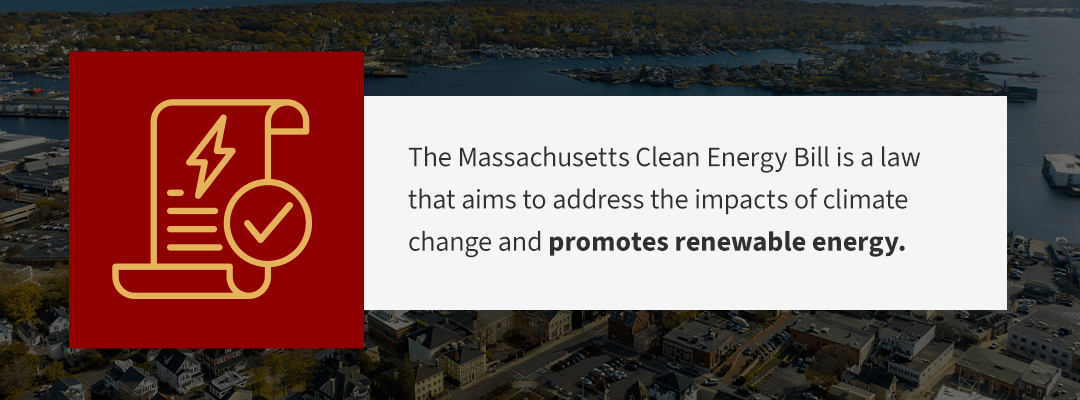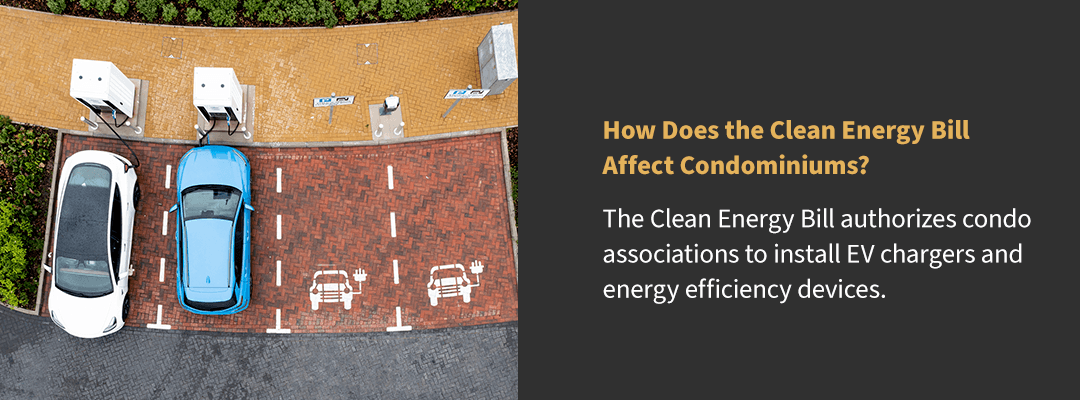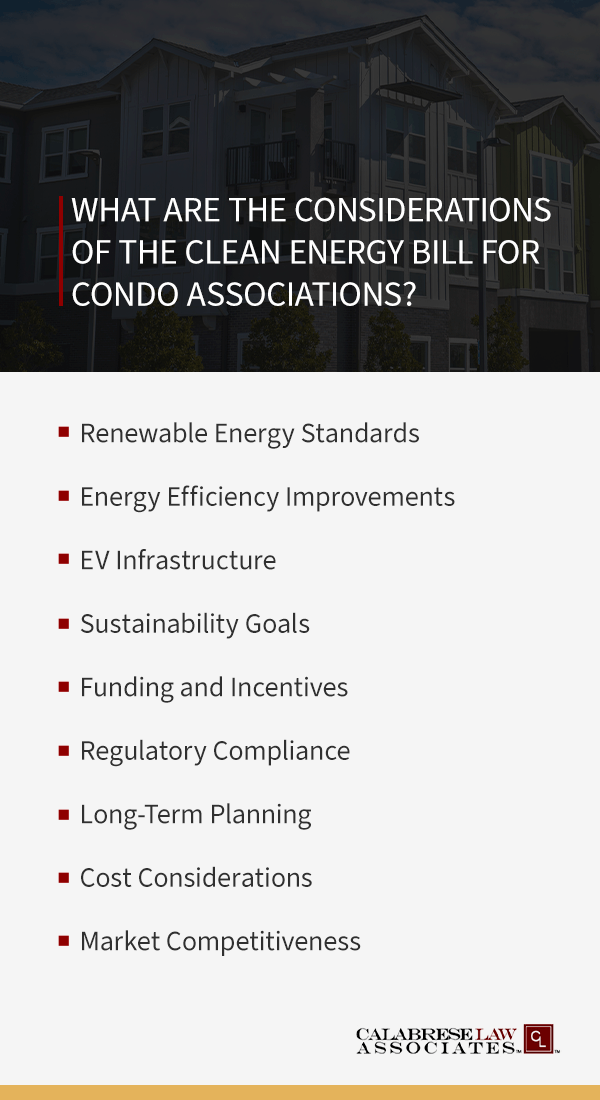As the world faces climate change, states like Massachusetts pursue a sustainable future. The recent Massachusetts Clean Energy Bill signals a commitment to renewable energy. But what does this mean for you as a condo owner or member of a condominium association? This law aims to embrace cleaner energy solutions, reduce costs, and enhance property values.
This new law can have profound implications for condominium residents. It focuses on installing electric vehicle charging stations and energy-efficient upgrades. The spirit of collaborative sustainability can enrich community life. However, it has operational and legal implications for condos.
This guide explores how the Massachusetts Clean Energy Bill affects condos. It dives into legal considerations, potential issues, and steps condo associations can take.
What Is the Massachusetts Clean Energy Bill?
The Massachusetts Clean Energy Bill is a law that aims to address the impacts of climate change and promotes renewable energy. The state passed the legislation on November 14, 2024. Governor Maura Healey signed it on November 20, 2024. The law has several key objectives:
1. Promote a Clean Energy Grid
The law simplifies the approval process for clean energy projects, accelerating planning and approval for solar panels, wind turbines, and other systems.
- Large projects will get one permit instead of many, with a 15-month approval deadline.
- Smaller projects will also have a single permit, requiring action within 12 months.
- New offices will help improve community review and support fair evaluations of projects.
- The state will improve the current infrastructure to lower costs for residents.
- An online dashboard will keep the public informed about the project’s progress.
2. Protect Ratepayers
The Clean Energy Bill aims to lower electricity rates for low- to mid-income households and help residents avoid high energy bills.
- The law encourages gas companies to develop eco-friendly heating systems.
- The Department of Public Utilities will consider climate impacts when approving expansions.
- The law examines alternatives to replacing old gas pipes with new ones.
- A commission will analyze job impacts to support gas workers during this transition.
- Utility companies will offer lower rates to eligible consumers.
3. Build Electric Vehicle (EV) Infrastructure
The law seeks to promote the use of electric vehicles by adding more EV charging stations. More EVs on the road lead to fewer emissions. Massachusetts already has a program to encourage EV adoption.
The Massachusetts Offers Rebates for Electric Vehicles (MOR-EV) Program offers rebates to consumers who register on-road zero-emission vehicles in the state. This program provides a potential rebate of $3,500 to $6,000 for qualifying EV purchases or leases. The Clean Energy Bill extends the MOR-EV incentive program to 2027.
The Clean Energy Bill also simplifies the process for towns to buy EV school vehicles and charging infrastructure and requires state guidance on safe EV cars and battery storage.
4. Incentivize Innovative Technologies
The Clean Energy Bill encourages the adoption of new technologies to promote cleaner energy. Some of these technologies include:
- Fusion energy: Massachusetts includes fusion energy in its Renewable Energy Portfolio.
- Energy storage: The law sets a goal of 5,000 megawatts for energy storage to support solar and wind power.
- Advanced metering: More people will use electric vehicles and heat pumps. Advanced metering infrastructure (AMI), such as smart meters and data systems, will help manage the electric grid better. Utilities must set up a central data hub, which customers can opt into or out of.
- Offshore wind: The law supports the offshore wind industry by allowing longer contract terms of 15 to 30 years. It also reviews the impact of emissions and ensures high labor standards. Mandates provide guidance on power agreements between offshore wind developers and towns.
How Does the Clean Energy Bill Affect Condominiums?
The Clean Energy Bill amends the Massachusetts Condominium Act, G.L. c. 183A. It authorizes condo associations to install EV chargers and energy efficiency devices. Here’s a breakdown of the changes to the act:
Section 84: Energy Saving Devices
Section 84 changes Section 6 of Chapter 183A of the act’s rules for energy-saving devices. It removes the list of specific devices condo owners must install, like water meters and low-flow toilets. Now, owners must follow the condo association’s decisions for installing energy-saving devices. Owners have flexibility in choosing energy-efficient solutions with more responsibility on the association.
Section 85: Utilities
This section replaces subsection B of section 10 on energy-saving measures. Condo associations must install energy-saving measures in units without separate utility meters.
- These measures may include separate meters, low-flow fixtures, and energy-efficient windows. It excludes solar systems.
- Only common areas will need EV charging equipment.
- Associations will pass on installation costs to unit owners through special assessments.
- Residents may share utility costs based on usage.
- This law precedes any conflicting condominium documents and complies with state codes.
- The governing board must establish usage terms for installing EV equipment.
Section 86: EV Supply Equipment
This section defines terms for electric vehicle supply equipment (EVSE) in residential areas.
- Installation restrictions: Condo associations cannot prohibit owners from installing EVSE.
- EVSE approvals: Associations must approve or deny EVSE applications. Approvals must be in writing within 60 days without excessive fees.
- Owner responsibility: Owners must disclose EVSE and cover maintenance, repair, and electricity costs. They must also handle removal if needed.
- Common areas: Associations can install EVSE with established usage terms in common areas.
What Are the Considerations of the Clean Energy Bill for Condo Associations?
The Massachusetts Clean Energy Bill has operational implications for condo associations, including:
Renewable Energy Standards
The law encourages the use of renewable energy sources. Associations may need to assess their energy sources and switch to renewable options, like solar panels. Transitioning to renewable energy may have cost implications, such as financing options and potential long-term savings.
Energy Efficiency Improvements
The Clean Energy Bill promotes energy efficiency upgrades in buildings. Condo associations may need to conduct energy audits and install efficiency measures, such as insulation and energy-efficient lighting. These upgrades can improve property values and reduce energy use.
EV Infrastructure
Condo associations might need to consider installing EV charging stations. This addition could involve making infrastructure upgrades and considering shared parking spaces.
Sustainability Goals
The law sets state climate goals, including reducing greenhouse gas (GHG) emissions. Associations may want to adopt sustainability practices like waste reduction and recycling.
Funding and Incentives
Massachusetts often provides grants and incentives for renewable energy projects and efficiency improvements. Associations should explore these opportunities to help cover upgrade costs.
Regulatory Compliance
The Clean Energy Bill may introduce new regulations on energy reporting and emissions reductions. Associations must stay informed about any regulatory changes.
Long-Term Planning
The law encourages long-term planning for climate resilience. Associations should consider how climate change could affect their properties. They need to develop plans to address these risks.
Cost Considerations
Many clean energy initiatives can lead to long-term savings. However, they often involve upfront costs. Associations must budget for these changes. Financing options should avoid placing financial strain on residents.
Market Competitiveness
Properties that embrace sustainability may be more attractive to potential buyers or renters. Associations that adopt clean energy measures can enhance their competitiveness in the market.
What Are the Legal Implications of the Bill for Condos?
The Clean Energy Bill has legal considerations for condo associations, such as:
Compliance With State Regulations
Associations must stay informed about the law’s specific requirements and regulations, including understanding reporting obligations and compliance deadlines. Local ordinances may also influence energy efficiency upgrades or renewable energy installations.
Amendments to Governing Documents
Associations may need to update their bylaws to accommodate new energy initiatives. Bylaws often include the following rules that the new law may impact:
- Energy upgrade costs: The rules must state if and how condo residents must pay for energy-saving installations in common areas.
- Hiring contractors: Associations may update bylaws to establish the procedure for hiring contractors.
- Regulations: Residents must understand how the new law affects the administrative rules and regulations governing common areas.
- Member approvals: Measures arising from the law, such as installing solar panels or EV charging stations, may need resident approval.
Contractual Obligations
Contracts for energy audits, installations, or improvements must be clear. Contractors should understand the scope of work, costs, and liabilities. Associations must understand the terms of any Power Purchase Agreement (PPA) for solar energy.
Liability and Insurance
Associations should review their insurance coverage for new installations or energy efficiency upgrades. Updating policies may be necessary to account for potential risks and liabilities. Reviewing indemnification clauses in service provider contracts is also a good idea.
Ownership Rights
According to Massachusetts law, condo unit owners maintain exclusive possession and ownership of their individual units. Owners should ensure installations, like solar panels or charging stations, don’t infringe on the rights of other unit owners. Speak to a legal adviser if energy systems need access to neighboring property.
Discrimination and Fair Housing
Associations should ensure that initiatives, such as EV charging stations, benefit all residents. Avoid bias and be aware of the need to provide reasonable accommodations for residents with disabilities.
Financing and Assessment Procedures
Financing energy improvements through special assessments must meet legal requirements. Associations may need to notify owners and conduct votes. They must also be transparent about the financial implications of energy projects.
Dispute Handling
Engage residents in discussions about energy initiatives and ensure that decision-making is transparent. Establish procedures for conflict resolution if disagreements arise over energy initiatives or funding.
Evolving Regulations
Future changes to clean energy regulations or policies may affect the condo. Associations should stay alert to adapt governing documents and operational practices as needed.
What Steps Can Condominium Associations Take?
Condo associations can navigate the Clean Energy Bill by taking the following steps:
- Educate members: Organize workshops or meetings to inform residents about the law and provide regular updates on clean energy initiatives.
- Conduct an energy audit: Hire a qualified energy auditor to assess energy usage. The audit will identify areas for improvement, focusing on potential upgrades. Measures can include insulation and energy-efficient windows.
- Develop a sustainability plan: Establish the community’s short-term and long-term sustainability goals. Create an action plan outlining specific steps, timelines, and responsibilities.
- Explore renewable energy: Investigate the feasibility of installing solar panels on the property. Consider community solar options if individual installations are not viable.
- Improve energy efficiency: You can take simple steps to make a condo building more energy-efficient. Replace incandescent bulbs with LED lighting, install smart thermostats, or use water-saving fixtures.
- Plan for EV infrastructure: Survey residents to gauge interest in EVs. If demand is high enough, it will help determine the need for charging stations.
- Leverage state and federal incentives: Investigate available grants and incentives for renewable energy. Work with local utility companies to identify programs that offer financial help.
- Engage with government: Collaborate with local government sustainability initiatives or organizations. They can provide guidance and keep you informed about local regulations.
- Establish a committee: Encourage residents to join a committee dedicated to sustainability initiatives.
- Monitor and report progress: Establish metrics to track energy consumption. Provide regular updates to the community on progress toward sustainability goals.
- Prepare for regulatory changes: Keep up with any new regulations or requirements. Develop strategies for compliance.
- Seek legal advice: Engage legal counsel with condominium law expertise. Attorneys can ensure that actions taken in response to the law are legal and compliant.
The Massachusetts Clean Energy Bill presents exciting opportunities for condominium owners and associations. It offers a chance to turn living spaces into models of energy efficiency. This legislation encourages renewable energy, equitable infrastructure, and lower costs. It also fosters a sense of community by promoting shared sustainability goals.
While the new regulations present challenges, they also offer growth opportunities. As we move forward, let’s embrace this change. Together, we can foster a community that prioritizes sustainability and resilience. Condos can become thriving communities that reflect a commitment to a greener future.
Why Trust Us?
Calabrese Law Associates is an industry leader in Massachusetts condominium law. Our dedicated team understands the unique challenges and complexities that condominium associations face. We specialize in tailored legal solutions for condo owners and associations.
Our attorneys stay updated with the latest bills and laws to offer clients informed guidance. We are well-versed in the intricacies of the Massachusetts Condominium Act.
We build client relationships based on trust, transparency, and open communication. Our client-centered approach means we take the time to understand your individual needs. Whether facing disputes, compliance issues, or needing legal advice, we are here to help.
Our team is passionate about protecting your interests and enhancing your community. Let us help you achieve peace of mind and ensure your condominium operates at its best. Your success is our priority.
Get Help With the Legal Implications of the Clean Energy Bill
At Calabrese Law Associates, we understand that new laws can be daunting. As a condo association member, a unit owner, or a building manager, you might wonder what the Clean Energy Bill means for you. Our condominium law attorneys have in-depth knowledge of Massachusetts laws and condo regulations. We have the experience to help your condo association meet legal requirements and guide you on what action to take.
Trust Calabrese Law Associates to help you navigate legal matters with confidence. Contact us today to learn more about our services.







